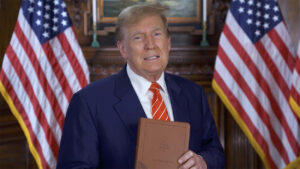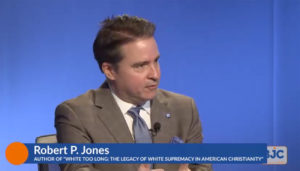WASHINGTON (RNS)—The support of white Christians once again proved key to Donald Trump’s election victory.
While the United States has become more religiously diverse in recent decades, white Christians remain the largest religious segment of the country, making up about 42 percent of the population, according to data from the Public Religion Research Institute.
Exit poll data from CNN and other news outlets reported 72 percent of white Protestants and 61 percent of white Catholics said they voted for Trump.

Among white voters, 81 percent of those identified as born-again or evangelical supported Trump, up from 76 percent in 2020 and similar to the 80 percent of support Trump received in 2016.
Ryan Burge, associate professor of political science at Eastern Illinois University, said that kind of support is hard to overcome, especially in the Rust Belt swing states that helped seal Trump’s victory.
“It’s hard to overcome the white God gap in a place like Pennsylvania, or Michigan and Wisconsin,” he said.
But Trump also won the Christian vote overall. Early exit polls indicated 58 percent of all Catholics voted for him and 63 percent of Protestants. If the poll numbers hold steady, that will prove to be a jump in Catholic support for Trump compared with 2020, when 50 percent of Catholics voted for him.
Increased Trump support among Hispanics
Some of that may have to do with an increase in Trump support among Hispanic voters. Almost two-thirds of Hispanic Protestant (64 percent) and just over half of Hispanic Catholic voters (53 percent) also supported Trump, according to initial CNN exit polls. In the 2020 election, only about a third of Hispanic Catholics voted for Trump.
Jews (78 percent), other non-Christians (59 percent) and those with no religious affiliation (71 percent) supported Kamala Harris, according to the CNN exit poll.

Robert Jones, president of Public Religion Research Institute, said more data is needed to understand the Hispanic vote in the 2024 election. But he wonders whether economics played a major role in Hispanic support for Trump, more than religion.
“They don’t feel like their situation has improved over the past four years,” he said.
Jones said Trump was able to send two distinct messages during the campaign—one about being tough on immigration and crime, which appealed to white Christians, and the other about the economy, which appealed to Hispanic Christians.
Burge suspects Hispanic Catholics and Protestants are more conservative on social issues, such as abortion and LGBTQ rights, which also may have played a role in the election.
He wonders if the Harris campaign’s support for abortion rights, in particular, may have backfired with Hispanic Christians.
“That’s a hard message for a moderate Hispanic voter,” he said, adding that while voters in a number of states supported abortion rights, that did not carry over to overall support for Harris.
Burge also wonders if inflation and other issues about the economy swung the elections. While Trump is known for causing controversy online, Burge said, many voters are paying more attention to day-to-day concerns.
“All they are thinking is, gas is expensive, bread is expensive, milk is expensive,” he said. “Let’s try something else. That’s the story.”
Concerns about decline of religion in culture
Both white and Hispanic Christians may also be worried about the changing nature of America and the decline of religion’s power in the culture. While few Americans want the nation to have an official Christian religion, many do see Christianity as important or feel a nostalgia for God and country patriotism, rather than a culture where secular values dominate.
And the swing states that decided the election, such as Wisconsin, are places where white Christians—especially white mainline Protestants and white Catholics who supported Trump—are found in large numbers.
Samuel Perry, a University of Oklahoma sociologist who studies Christian nationalism and other religious trends, wonders if the growth of nondenominational and Pentecostal churches in the United States may have played a role in the 2024 races.
Those churches are often multiethnic, he said, but not because white Christians are joining predominantly Black or Hispanic Christians. Instead, he said, Christians of color are joining majority-white churches that often lean Republican. That can affect their voting patterns, he said.
“Their allegiance is not to their ethnic group, who tend to vote Democrat,” he said. “It’s going to be more of a multiethnic conservative, white-dominated Christianity that unequivocally votes Republican.”
Jones said the 2024 election once again shows the close allegiance between white Christians and the Republican Party and the divided nature of religion in America.
Most faith categories in America—Jews, Muslims, Black Protestants, nonreligious Americans and, until 2024, Hispanic Catholics—have supported the Democratic Party. White Christians, on the other hand, remained tied to Republicans.
“They have not moved a centimeter,” said Jones. “And they get out and vote.”















We seek to connect God’s story and God’s people around the world. To learn more about God’s story, click here.
Send comments and feedback to Eric Black, our editor. For comments to be published, please specify “letter to the editor.” Maximum length for publication is 300 words.